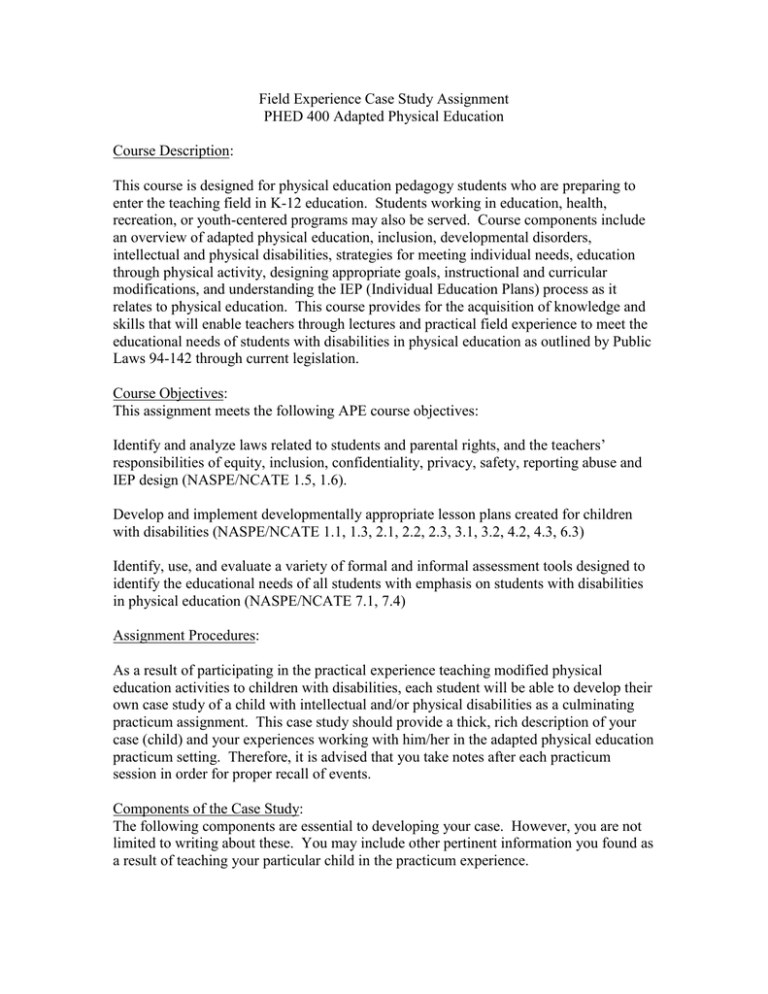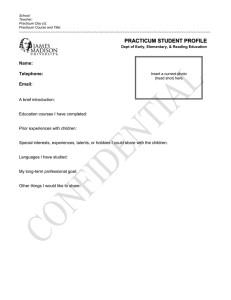Field Experience Case Study Assignment PHED 400 Adapted Physical Education Course Description:
advertisement

Field Experience Case Study Assignment PHED 400 Adapted Physical Education Course Description: This course is designed for physical education pedagogy students who are preparing to enter the teaching field in K-12 education. Students working in education, health, recreation, or youth-centered programs may also be served. Course components include an overview of adapted physical education, inclusion, developmental disorders, intellectual and physical disabilities, strategies for meeting individual needs, education through physical activity, designing appropriate goals, instructional and curricular modifications, and understanding the IEP (Individual Education Plans) process as it relates to physical education. This course provides for the acquisition of knowledge and skills that will enable teachers through lectures and practical field experience to meet the educational needs of students with disabilities in physical education as outlined by Public Laws 94-142 through current legislation. Course Objectives: This assignment meets the following APE course objectives: Identify and analyze laws related to students and parental rights, and the teachers’ responsibilities of equity, inclusion, confidentiality, privacy, safety, reporting abuse and IEP design (NASPE/NCATE 1.5, 1.6). Develop and implement developmentally appropriate lesson plans created for children with disabilities (NASPE/NCATE 1.1, 1.3, 2.1, 2.2, 2.3, 3.1, 3.2, 4.2, 4.3, 6.3) Identify, use, and evaluate a variety of formal and informal assessment tools designed to identify the educational needs of all students with emphasis on students with disabilities in physical education (NASPE/NCATE 7.1, 7.4) Assignment Procedures: As a result of participating in the practical experience teaching modified physical education activities to children with disabilities, each student will be able to develop their own case study of a child with intellectual and/or physical disabilities as a culminating practicum assignment. This case study should provide a thick, rich description of your case (child) and your experiences working with him/her in the adapted physical education practicum setting. Therefore, it is advised that you take notes after each practicum session in order for proper recall of events. Components of the Case Study: The following components are essential to developing your case. However, you are not limited to writing about these. You may include other pertinent information you found as a result of teaching your particular child in the practicum experience. 1. Detailed description of your case (student), including, but not limited to the following: a. Name b. age c. grade level d. disability e. characteristics (physical, emotional, cognitive) 2. Brief background on the disability of the student. Include (but not limited to) a medical definition, description, additional forms of this disability (ex. different types of cerebral palsy), and common characteristics. 3. Describe strengths and abilities of the student. Additionally, describe any challenges (including psychomotor, behavioral, cognitive, social) you discovered that prevented them from achieving the objectives. 4. Description of activities which were taught throughout the practicum. Include any helpful teaching strategies and modifications (instructional, curricular, both) to these activities and the student’s response to the modifications. 5. Final reflective thoughts related to your case study to serve as a conclusion. Your case study should be approximately 3 double-spaced, stapled pages in length. The case must be typewritten in 12 point font Times Roman. It should be free of grammatical and spelling errors. Resources (limited to one website) must be cited at the end of the case study in proper APA format. Please refer to the library website for correct citation references. The following scoring rubric will be used to assess your case study. Utilize this rubric as a content guide for your assignment. Writing Across the Curriculum. All writing assignments, both formal and informal, are in support of Salisbury University’s Writing Across the Curriculum Program. At the University Writing Center (Guerrieri University Center, Room 213), trained consultants are ready to help you at any stage of the writing process. It is often helpful for writers to share their work with an attentive reader, and consultations allow writers to test and refine their ideas before having to hand papers in or to release documents to the public. All undergraduates are encouraged to make use of this important student service. For more information about the writing center’s hours and policies, visit the writing center or its website at www.salisbury.edu/uwc. Due Date: This assignment is due at the beginning of class on Monday, April 19. No electronic submissions will be accepted for this assignment. It is worth 30 points of your practicum grade.


